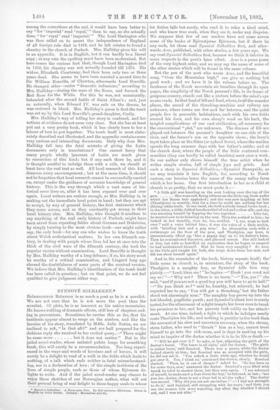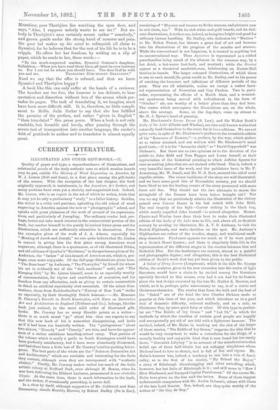SYNNOVE SOLBAKKEN.*
131tiliNSTJERNE DAVISON is as much a poet as he is a novelist. We are not sure that he is not more the poet than the novelist. Of plots, he is as innocent as his native mountains. He knows nothing of dramatic effects, still less of chapters end- ing in perorations. Sometimes he carries this so far, that his incidents appear almost to verge on the aimless, and like the heroine of his story, translated by Mdlle. Julie Sutter, we are inclined to ask, "Is that all P" and are half prepared for the dubious reply she received to her excited query,—" There might
be some more but it does not matter." But to the jaded novel-reader, whose satiated palate longs for something fresh, this will surely be a recommendation. Too long experi- enced in the ways and words of heroines and of heroes, it will surely be a delight to read of a walk in the fields which leads to nothing, of a talk which ends neither in fatal misunderstand- ing, nor in a declaration of love ; of the simple incidents of the lives of simple people, such as those of whom Bjornson de- lights to write. And if the jaded. novel-reader may chance to enjoy these sketches of our Norwegian author, what will not their perusal bring of real delight to those happy souls to whose
kiiinofitA Solbakken. A Norwegian Tale, By Bpi hatiorne BOrneen. Given in English by Julio Sutter: London : Macmillan and (lo.
lot fiction falls but rarely, who read it to relax a tired mind, and who know true work, when they see it, under any disguise. We suppose that few of our readers have not come across some of the books of Bjornstjerne Bjornson, but if there be any such, let them read S pave Solbakken first, and after- wards Arno, published, with other stories, a few years ago. We say read Synnove Solbeeken first, because we think it inferior in some respects to the poet's later effort. Arno is a prose poem of the very highest order, and we may say the same of some of the other stories which will be found in the same volume.
But the pen of the poet who wrote Arne, and the beautiful song, " Over the Mountains high," can give us nothing but good work ; and we have it in the volume before us. The freshness of the Norsk mountain air breathes through its open pages, the simplicity of the Norsk peasant's life, in its frame of gorgeous scenery, stands out like a picture before the mind's eye as one reads. In that land of fell and fi o rd, wh ere, mall the remoter places, the sound of the threshing-machine and railway are unknown, where towns are few and far between, and the quiet people live in peaceable habitations, each with his own fields around hie door, and his own sheep's wool on his back, the tangled complications of our vast civilisation, all necessary for the conventional "plot," are unknown. The dramas of life are played out between the peasant's daughter on one side of the river, and the farmer's son on the opposite shore ; the lover's tryst takes place at the Sitter (or upland farm), where the maiden spends the long summer days with her father's cattle ; and at the church door, where the people of the little scattered com- munities (they can hardly be called hamlets) meet once a week. So our author only shows himself the true artist when he writes simple stories, full of simple joys and griefs. And. such a story is Synnov6 Solba7e1en,—Synni34 Sunnyside, as we may translate it into English, for, according to Norsk custom, our heroine bears the name of the sunny valley farm which is her home. Our first introduction to her as a child at church is so pretty, that we must quote it ;— "A little girl was kneeling on the seat looking over the top of the pew She wore red, flying ribbons on the little cap, from under which her flaxen hair appeared ; and she was now laughing at him (Thorbjarn) so merrily, that for a time he could see nothing but her shining white teeth. In one hand, she held a nicely-bound hymn-book; in the other, a tidily-folded handkerchief of red and yellow silk ; and she
was amusing herself by flapping the two together Like her, he wanted now to be kneeling on the seat. Then she nodded to him ; he looked at her steadily, then he, too, nodded. 'I, too, want to look over !' said a voice behind him ; it was the voice of a little urchin, with 'bristling hair and a pug nose.' An altercation ends with a scrimmage on the floor of the pew, and Thorbj5rn, our hero, is ignominiously lifted up, 'like a puppy dog,' on to his father's knee. Then he remembered SynntivO, and glanced across. She still looked at him, but with so horrified en expression that he began to suspect he bad misbehaved himself, lied be been very naughty P As soon as the little girl caught his look, she crept down from her seat, and did not show herself again."
And in the remainder of the book, history repeats itself; the little scene in church is, in miniature, the story of the book. Thorbjarn is a naughty boy, as Synnovt5 tells him very plainly : —" Lord, bless me ! "he begins.—" Hush ! you must not say so I "—" Why not? There is no harm."—" Yes, yes!" she said, "and if you are not a good boy you will have to go to hell!" —" Do you think so P " said he, humbly, but relieved; he had expected her to say, You will get a thrashing,' but the father stood not alarmingly near." The naughty boy grows up into the hot-blooded, pugilistic youth ; and. Synno vd's silent love is sorely tested,for the allurement of a fight tempts her lover even to break his promises to her, and her parents look coldly on her attach- ment. It one time, indeed, a fight in which he indulges nearly costs Thorbjorn his life; and nothing is prettier in the book than the account of his slow and uncertain recovery, when the strong, stern father, who used to " thrash " him as a boy, cannot trust himself to go into the sick-room, and is days in making up his mind to inquire of the doctor whether it is to be life or death :— "'Will he get over it ?' he asks, at last, adjusting the girth of the
doctor's horse. The horse is all right,' said the doctor. 'The girth is rather loose,' said Samiind. There was a pause, while the doctor looked closely at him ; but Samilnd was so occupied with the girth, he did not see it. 'You asked, a little while ago, whether he would get over it. Yes, I think so,' continued the doctor, slowly. Saraiind started. 'Then, be is out of danger P' asked he. 'He has been so for some days, now,' answered the doctor. Sairined's eyes filled with tearal; he tried to master them, but they rose again. 'I am ashamed of myself, to make such a fuss about the boy,' he faltered, at last ; but you see, doctor, there is not a finer lad in all the valley.' The doctor was moved. Why did you not ask me before ? I had not strength to do it,' said Samiind, still struggling with his tears, and then, you see, the women folk wore watching day after day whether I should ask, and I was not able.'"
Meantime, poor Thorbjorn lies watching the open door, and says, "Alas, I suppose nobody wants to see me !" But no- body in Thorbjorn's case certainly meant rather " somebody," and grown gentle under the strong hand of remorse and pain, the poor lad makes up his mind to relinquish all claim to Synnov6, for he believes that for the rest of his life he is to be a cripple. He offers her her freedom, by writing on a slip of paper, which he sends to her, these words :—
"To the much-respected maiden, Synnav6 Guttom's daughter, Eolbakken.—When you have read these lines, all must be over between us. For I am not he whom you should have. The dear God be with you and me. THORBJoRN SXMUMDSSEN GRANLIDEN." Need we say that the offer is refused, and that we leave Synrifiv6 and Thorbjorn havy A book like this can only suffer at the hands of a reviewer. The touches are too fine, the humour is too delicate, to bear quotation and dissection without loss of the aroma which per- vades its pages. The task of translating it, we imagine, must have been more difficult still, It is, therefore, no little compli- ment to Mdlle. Julie Sutter to say that she has fulfilled the promise of the preface, and rather "given in English" "than translated" this prose poem. When a book is not only readable, but loveable and lovely, after passing through the severe test of transposition into another language, the reader's debt of gratitude to author and to translator is almost equally great,
.



































 Previous page
Previous page